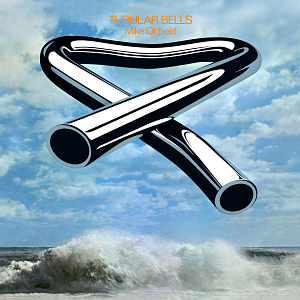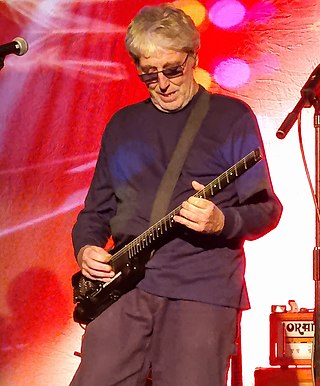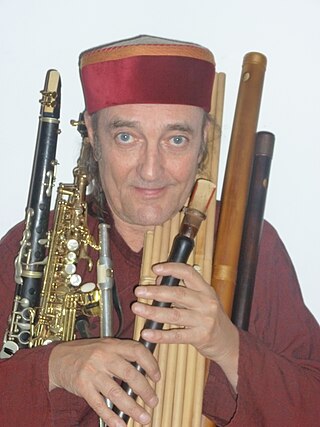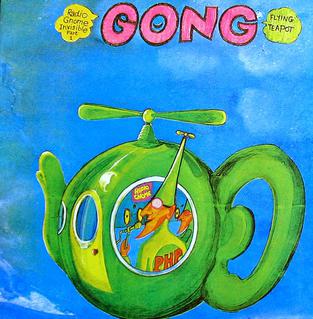
Gong are a psychedelic rock band that incorporates elements of jazz and space rock into their musical style. The group was formed in Paris in 1967 by Australian musician Daevid Allen and English vocalist Gilli Smyth. Band members have included Didier Malherbe, Pip Pyle, Steve Hillage, Mike Howlett, Tim Blake, Pierre Moerlen, Bill Laswell and Theo Travis. Others who have played on stage with Gong include Don Cherry, Chris Cutler, Bill Bruford, Brian Davison, Dave Stewart and Tatsuya Yoshida.

Tubular bells (also known as chimes) are musical instruments in the percussion family. Their sound resembles that of church bells, carillons, or a bell tower; the original tubular bells were made to duplicate the sound of church bells within an ensemble. Each bell is a metal tube, 30–38 mm (1+1⁄4–1+1⁄2 in) in diameter, tuned by altering its length. Its standard range is C4–F5, though many professional instruments reach G5. Tubular bells are often replaced by studio chimes, which are a smaller and usually less expensive instrument. Studio chimes are similar in appearance to tubular bells, but each bell has a smaller diameter than the corresponding bell on tubular bells.

Tubular Bells is the debut studio album by the British musician Mike Oldfield, released on 25 May 1973 as the first album on Virgin Records. It comprises two mostly instrumental tracks. Oldfield, who was 19 years old when it was recorded, played almost all the instruments.

Stephen Simpson Hillage is an English musician, best known as a guitarist. He is associated with the Canterbury scene and has worked in experimental domains since the late 1960s. Besides his solo recordings he has been a member of Khan, Gong and System 7.

Didier Malherbe, is a French jazz, rock and world music musician, known as a member of the bands Gong and Hadouk, as well as a poet.

Timothy "Tim" George Hodgkinson is an English experimental music composer and performer, principally on reeds, lap steel guitar, and keyboards. He first became known as one of the core members of the British avant-rock group Henry Cow, which he formed with Fred Frith in 1968. After the demise of Henry Cow, he participated in numerous bands and projects, eventually concentrating on composing contemporary music and performing as an improviser.
Thomas Dennis Newman is an English record producer and musician. In 1970 he began working with Richard Branson and helped to found The Manor Studio in Oxford for the nascent Virgin Records. There he produced the recording of Mike Oldfield's Tubular Bells.

Angel's Egg is the fourth studio album by the progressive rock band Gong, released on Virgin Records in December 1973.

Flying Teapot is the third studio album by the progressive rock band Gong, originally released by Virgin Records in May 1973. It was the second entry in the Virgin catalogue (V2002) and was released on the same day as the first, Mike Oldfield's Tubular Bells (V2001). It was re-issued in 1977, with different cover art, by BYG Actuel in France and Japan. Recorded at Virgin's Manor Studios, in Oxfordshire, England, it was produced by Giorgio Gomelsky and engineered by "Simon Sandwitch 2 aided by Tom Zen".
Pierre Moerlen was a French drummer and percussionist, best known for his work with Gong and Mike Oldfield and as Pierre Moerlen's Gong.

The Orchestral Tubular Bells is an orchestral version of Mike Oldfield's album Tubular Bells, arranged by David Bedford and recorded in 1974 by the Royal Philharmonic Orchestra, featuring Oldfield himself playing the guitar. Excerpts from the album were featured in the 1979 NASA film The Space Movie. It peaked at #17 on the UK Albums Chart in 1975.

"Mike Oldfield's Single " is the debut single by the English musician Mike Oldfield, released in 1974.

Shamal is the sixth studio album released under the name Gong and was released by Virgin Records on 13 February 1976 The album, produced by Pink Floyd drummer Nick Mason was recorded in December 1975. The album was recorded by a unique line-up referred to later as "Shamal-Gong". It is usually regarded as a transitional album between Daevid Allen's incarnation of the band and the Pierre Moerlen-led fusion line-up of the late 1970s.
Clearlight is a French progressive rock band formed in 1973, although their best known work was produced in England and released by a major British record company. While progressive rock is an appropriate overall genre for the band, much of their work delves into other genres including psychedelic music, jam band music, symphonic rock, space rock, jazz fusion, and new-age music.

Delired Cameleon Family is a progressive rock album by the group of the same name, released in 1975 on EMI Records in France. It features musicians associated with the Clearlight project, most notably its leader, pianist Cyrille Verdeaux, and Musica Elettronica Viva member Ivan Coaquette, who joined forces to compose the soundtrack for the film Visa de Censure No. X by French actor Pierre Clementi.

Forever Blowing Bubbles is a progressive rock album by Clearlight, released in 1975 on Virgin Records in the UK.

Les Contes du Singe Fou is a progressive rock album by Clearlight, released in 1977 on Isadora Records in France.

L is the second studio album by British progressive rock musician Steve Hillage.

Visions is a progressive rock album by Clearlight, released in 1978 on Celluloid / LTM Records in France.
















